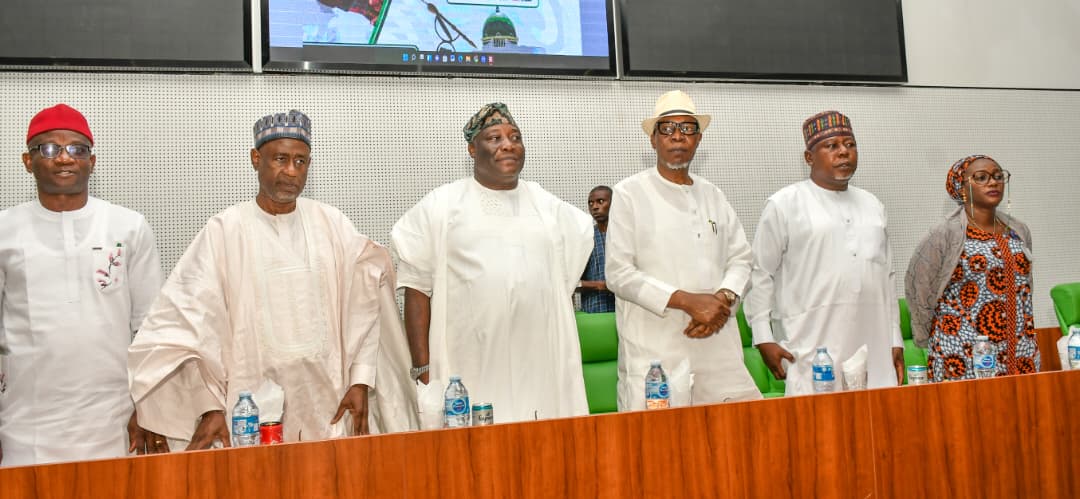
Stakeholders in Nigeria’s Aviation sector have thrown their weight behind a proposed bill to establish the African Aviation and Aerospace University (AAAU) in Abuja.
They described the initiative as a timely and strategic step towards addressing the acute manpower shortage that has long hindered the growth of the aviation and aerospace industry across Africa.
Speaking at a public hearing organised by the House Committee on Aviation Technology, stakeholders from government, academia, and industry highlighted that the proposed University would “position Nigeria as a continental centre for aviation research, innovation, and training.”

The Minister of Aviation and Aerospace Development, Festus Keyamo described the proposed university as ‘a visionary project aligned with the ministry’s long-term goal of making Nigeria a global aviation training hub.’
He noted that the Ministry initiated AAAU in 2023 to close the human capacity gap in the sector and promote home-grown research and innovation.
According to him, “the proposed legislation would provide the institution with a solid legal framework and autonomy to sustain its mandate.’
“The African Aviation and Aerospace University represents more than an educational institution; it is the future of aviation manpower development on the continent,” the Minister said.
He commended the National Assembly for its foresight in giving legislative backing to the project, noting that it would “strengthen Nigeria’s position as Africa’s aviation and aerospace leader.”
He was represented at the event by the Permanent Secretary, Dr Ibrahim Abubakar,
The Chairman of the University’s Governing Council, Mr Bukar Goni Aji, said the institution had achieved significant milestones since inception and now required full legal recognition to consolidate its progress.

He explained that the Nigerian government had already allocated 200 hectares of land along Bill Clinton Drive, Abuja, as the permanent site for the university, with several structures completed and relocation already underway.
Aji said,; “The passage of this Bill will enhance confidence in the university’s credentials, attract global collaborations, and ensure sustainable funding mechanisms.
“It will also help Nigeria achieve its vision of becoming Africa’s leading aviation training and innovation hub.”
Representing the University’s management, staff, and students, the Registrar, Dr Mustapha Sheikh Abdullahi, stated that AAAU had made remarkable progress since it began operations in 2023 with executive approval from the Nigerian Government.
He said that “the institution had secured accreditation from both the National Universities Commission (NUC) and the Joint Admissions and Matriculation Board (JAMB), and currently offers over seven accredited undergraduate and postgraduate programmes, with its first postgraduate students set to graduate this year.”
He also revealed that the university had conducted executive capacity-building programmes for major Aviation agencies, training more than 300 personnel from the Nigerian Civil Aviation Authority (NCAA), the Nigerian Airspace Management Agency (NAMA), and the Nigerian Safety Investigation Bureau (NSIB).
“Our support for this Bill is total.
“It will provide the legal framework needed to expand our reach, attract global partnerships, and fulfil Nigeria’s and Africa’s aviation manpower needs,”he said
The Rector of the Nigerian College of Aviation Technology (NCAT), Capt. Danjuma Ismail, expressed full support for AAAU’s establishment, describing it as a complementary initiative rather than a competing one.
He explained that while NCAT focuses on pilot and technical training, AAAU would bridge the academic and research gaps by offering advanced degrees and fostering innovation in the aviation sector.
He said; “Many aviation professionals lack access to postgraduate qualifications. The new university will provide that pathway.
“We are already collaborating with AAAU by providing instructors and technical support, and we urge the National Assembly to pass the Bill without delay.”
Also supporting the initiative, the Chief of Air Staff, Air Marshal Hasan Bala Abubakar, stressed that aviation and aerospace disciplines require not only academic excellence but also a strong institutional culture of discipline, compliance, and safety.
He noted that the Nigerian Air Force, with its vast experience in aviation education, recognised the strategic importance of AAAU in advancing national security, economic growth, and Africa’s leadership in aerospace technology.
Quoting data from the International Civil Aviation Organization (ICAO) and Boeing’s 2024 forecast, Abubakar said “Africa would need more than 70,000 new aviation professionals between 2025 and 2044—including 23,000 pilots and 24,000 technicians—underscoring the urgency of developing human capacity.”
“The establishment of AAAU is not just desirable, it is imperative,” he said. “But it must embed discipline in governance, curriculum, and student conduct to produce professionals who can meet global standards,”he said.
Declaring the public hearing open, the Speaker of the House of Representatives, Mr Tajudeen Abbas, described the proposal as a “major step toward transforming Nigeria’s aviation landscape.”
He said the university would equip Nigerians with advanced skills, reduce reliance on foreign training, and promote home-grown research in safety and innovation.
“This initiative will position Nigeria as a hub for aviation and aerospace in Africa,” Abbas said.
He said; “I urge all stakeholders to support this Bill so we can build a robust and sustainable aviation ecosystem.”
Chairman of the House Committee on Aviation Technology, Mr Tajudeen Abisodun, said the Bill represents a historic opportunity for Nigeria to lead the continent in aviation education, technology, and research.
He noted that the proposed governance framework guarantees transparency, accountability, and institutional autonomy, enabling the university to operate at international standards.
“This university is not just for Nigeria—it is for Africa,” Abisodun declared.
He said; “It’s a bold declaration that we are ready to lead, innovate, and educate at the highest levels. Let us rise to this occasion with vision, unity, and purpose.”
Victoria Ibanga






